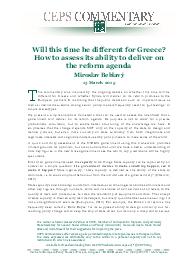Reinhart, Carmen, (2015), “Lessons for Greece: Forcible currency conversions from 1982 to 2015”, Voxeu, 9 July Contrary to the intent of the designers of what was to be an irreversible currency union, Greece may well exit the Eurozone. This column argues that default does not inevitably trigger the introduction of a new currency (or the re-activation of an old one). However, if ‘de-euroisation’ is the end game, then a forcible …Read More
Will this time be different for Greece? How to assess its ability to deliver on the reform agenda
Beblavý, Μ. (2015) “Will this time be different for Greece? How to assess its ability to deliver on the reform agenda“, Centre for European Policy Studies (CEPS) Commentary, 13 March. Τhis commentary was inspired by the ongoing debate on whether this time will be different for Greece and whether Syriza will deliver on its reform promises to the European partners. It is striking thatthe public debate on such an …Read More
Greece, Its International Creditors and the Euro
Sabri Öncü, T. (2015) “Greece, Its International Creditors and the Euro“, Naked Capitalism Blog, 17 February. Yves here. This is an excellent background piece on how Greece got where it is and how its various bailouts were structured. It also helps explain the past and current roles the various members of the Troika play and discusses the prospects for Greece achieving its aims. By T ([email protected]), a financial economist …Read More
The maths behind an amended Greek plan – additional ESM financing would allow the Greek primary surplus to be lowered to 3% of GDP
Darvas, Z. (2015) “The maths behind an amended Greek plan – additional ESM financing would allow the Greek primary surplus to be lowered to 3% of GDP“, Bruegel Institute, 11 February. Last week I published my assessment of Greek Finance Minister Yanis Varoufakis’ draft plan, and promised to do some calculations to illustrate its impacts. Mr Varoufakis abandoned the earlier haircut demand of Syriza that I welcomed as a …Read More
Tsipras’s Debt Plan Sends Athens Stock Market Sliding
Aldermanjan, L. (2015) “Tsipras’s Debt Plan Sends Athens Stock Market Sliding“, The New York Times – International Business, 28 January. Investors made clear on Wednesday the depth of their concerns about Greece’s new leftist-led government, driving up its borrowing costs, pushing down stock prices and highlighting the risks in the country’s banking system. Despite some soothing words from Prime Minister Alexis Tsipras, who at the first meeting of his …Read More
Why a Grexit is more costly for Germany than a default inside the euro area – Contrary to the IFO institute, we conclude that German losses on both official and private claims would be much higher if Greece exits the euro
Darvas, Z. & Hüttl, P. (2015) “Why a Grexit is more costly for Germany than a default inside the euro area – Contrary to the IFO institute, we conclude that German losses on both official and private claims would be much higher if Greece exits the euro“, Bruegel Institute, 16 January. A few days ago the influential IFO Institute published a short paper suggesting that a Greek default inside …Read More
How to reduce the Greek debt burden?
Darvas, Z. & Hüttl, P. (2015) “How to reduce the Greek debt burden? – There are options to reduce the net present value of Greek public debt servicing costs by more than 15 percent of GDP without incurring losses on creditors, Bruegel Institute Analyses, 09 January. The Greek debt reduction issue has been put back on the table as the 25 January 2015 parliamentary snap elections are approaching. Already in …Read More
Debt relief for Greece is necessary to avoid a crisis in the Eurozone
De Grauwe, Ρ. (2015) “Debt relief for Greece is necessary to avoid a crisis in the Eurozone“, LSE EUROPP, 12 January. On 25 January Greece will hold parliamentary elections. The elections have generated uncertainty in the Eurozone given the potential for the radical left party Syriza, which has called for a renegotiation of the country’s bailout conditions, to emerge as the largest party. Paul De Grauwe writes that even …Read More
Greece – two alternative views
Mitchell, B. (2014) “Greece – two alternative views“, Bill Mitchell Blog, Modern Monetary Theory… Macroeconomic Reality, 24 December. When I was in Europe recently, I had interesting discussions about the future of Italy, Greece and Spain with various people, particularly in relation to trying to understand the apparent dissonance between the strong support for the euro and the devastation that membership of the common currency has created in these …Read More
How to climb a mountain with both hands tied
Pisani-Ferry, J. (2014) “How to climb a mountain with both hands tied“, VoxEU Organisation, 07 November. A triple-dip recession in the Eurozone is now a distinct possibility. This column argues that additional monetary stimulus is unlikely to be effective, that the scope for further fiscal stimulus is limited, and that some structural reforms may actually hurt growth in the short run by adding to disinflationary pressures in a liquidity …Read More







